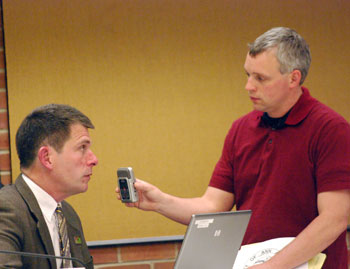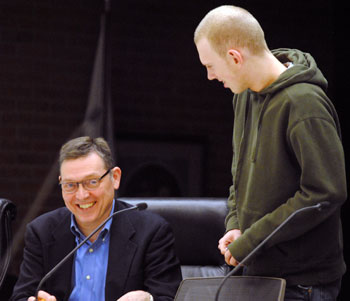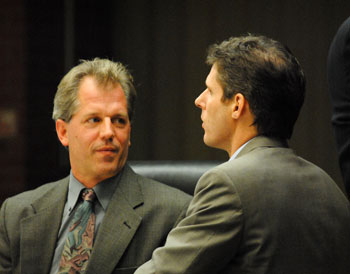Ann Arbor city council meeting (April 16, 2012): The most significant item on the council’s agenda was the introduction of the city’s proposed fiscal year 2013 budget by city administrator Steve Powers.

WEMU's Andrew Cluley had questions about the budget for Ann Arbor city administrator Steve Powers after the April 16 council meeting. Image links to Cluley's report. (Photos by the writer.)
But Powers led off the presentation by explaining that Monday evening would not be a time for detailed discussion and questions about the budget. For details of that presentation, see Chronicle coverage: “Ann Arbor Council Gets Draft 2013 Budget.”
The budget presentation occurred Monday night because of a city charter requirement. It was Powers’ first such presentation – as he was hired by the council last year, and started the job in September. The city council will have until May 21, its second meeting in May, to modify and adopt the budget.
In terms of the sheer number of agenda items, the topic of zoning and land use was a main focus of the meeting. The council unanimously rejected a proposed conditional rezoning of 1320 S. University to a higher density than its current D2 (downtown interface) designation. But winning unanimous approval was a site plan for a Tim Hortons on South State Street, near Ellsworth. The council also gave initial approval to AAA Michigan for a rezoning request involving a parcel on South Main, which the auto club would like to have designated as P (parking). A half dozen different rezoning requests for parcels that had recently been annexed into the city also received initial approval.
Prompting considerable discussion among councilmembers were four resolutions concerning an environmental study on a possible extension of a runway at the Ann Arbor municipal airport. The resolutions all passed, but the main grant funding went through on just a 7-4 vote. The city was being asked for an additional $1,125 in matching funds to wrap up the final stages of an environmental assessment being done by the Michigan Dept. of Transportation, which was already mostly completed two years ago.
Also related to transportation, the council authorized over $6 million in contracts related to street resurfacing projects. That included a second set of local streets (after having approved funding for the first set at its previous meeting) as well as the section of East Stadium Boulevard between Packard and Washtenaw. In connection with those infrastructure projects, the council also authorized contracts for materials testing.
In other action related to infrastructure, the council approved a $93,438 item for construction of unisex bathrooms in city hall – but not without questions about the scope of the overall municipal center renovation work.
On personnel-related items, the council gave final approval to legislation that incorporates provisions of the collectively bargained labor contracts with police command officers and firefighters into the city’s set of ordinances on retirement and health care.
As a result of other council action on Monday night, Ann Arbor police officers will be able to arrest and charge “super drunk” drivers who have more than 0.17 blood alcohol content – because the council modified the city’s ordinances to conform with recent changes in state law.
In other business, the council also authorized a contract with a new auditor, The Rehmann Group, set a hearing on a tax abatement for Sakti3, and imposed a temporary ban on digital billboards.
Highlights of public commentary included concerns about new DTE “smart meters” and localized flooding incidents in the city. The flooding was attributed by residents to the city’s layering of new asphalt onto an adjacent street, and to the city’s sanitary sewer disconnection program. [Full Story]






